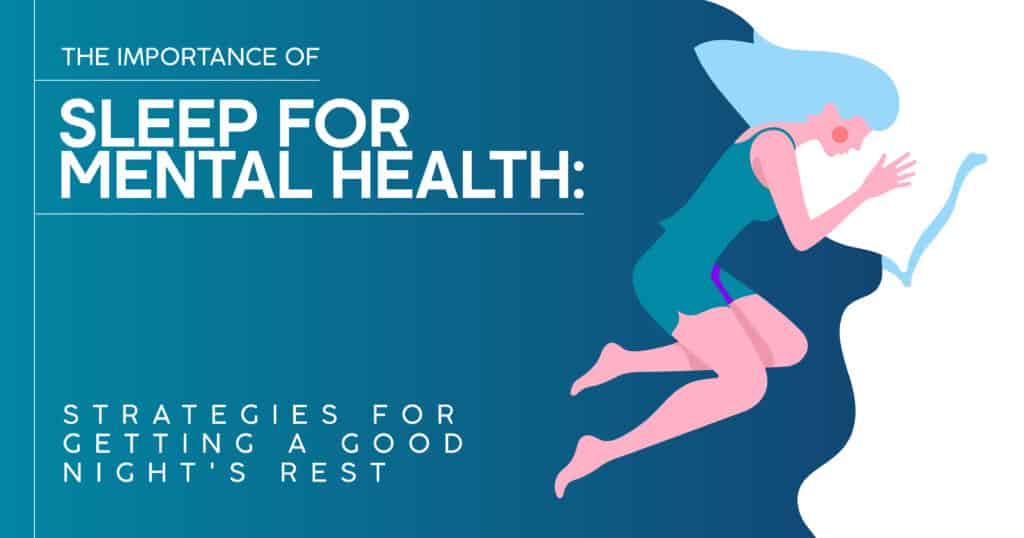In today’s fast-paced world, where hustle culture often glorifies productivity at the expense of rest, it’s easy to overlook the importance of a good night’s sleep. However, sleep is not just a luxury; it’s a fundamental pillar of our mental and physical health. In this comprehensive guide, we’ll delve into the power of sleep, exploring why it’s crucial for mental wellbeing and providing practical tips on how to achieve a restful night’s rest.
Understanding the Role of Sleep in Mental Wellbeing
Why is Sleep Important for Mental Health?
- Regulating Emotions: Adequate sleep plays a vital role in regulating emotions and coping with stress. Research suggests that sleep deprivation can impair emotional regulation, leading to increased irritability, mood swings, and anxiety.
- Enhancing Cognitive Function: Sleep is essential for cognitive function, including memory consolidation, problem-solving abilities, and decision-making skills. Without sufficient sleep, our cognitive abilities suffer, affecting our performance at work, school, and daily tasks.
- Supporting Mental Health Recovery: Quality sleep is crucial for individuals struggling with mental health disorders such as depression and anxiety. Sleep disturbances are common symptoms of these disorders, but improving sleep hygiene can significantly enhance treatment outcomes and overall wellbeing.
How Much Sleep Do We Need?
- According to the National Sleep Foundation, adults should aim for 7-9 hours of sleep per night for optimal health and wellbeing.
- However, individual sleep needs may vary based on factors such as age, lifestyle, and overall health.
California Mental Health
The Consequences of Sleep Deprivation
Impact on Mental Health
- Increased Risk of Depression and Anxiety: Chronic sleep deprivation has been linked to a higher risk of developing mood disorders such as depression and anxiety.
- Impaired Cognitive Function: Sleep deprivation impairs cognitive function, leading to difficulties in concentration, memory recall, and decision-making.
- Heightened Stress Levels: Lack of sleep can increase stress hormone levels, exacerbating feelings of anxiety and tension.
Effects on Physical Health
- Weakened Immune System: Sleep deprivation compromises the immune system, making individuals more susceptible to infections and illnesses.
- Weight Gain and Metabolic Disorders: Poor sleep is associated with weight gain, obesity, and metabolic disorders such as diabetes and cardiovascular disease.
- Increased Risk of Chronic Conditions: Long-term sleep deprivation is linked to an increased risk of chronic health conditions, including hypertension, stroke, and heart disease.
California Mental Health
Strategies for Getting a Good Night’s Rest
Establish a Consistent Sleep Schedule
- Set a Regular Bedtime: Going to bed and waking up at the same time every day helps regulate your body’s internal clock, promoting better sleep quality.
- Create a Relaxing Bedtime Routine: Engage in calming activities before bed, such as reading, gentle stretching, or taking a warm bath, to signal to your body that it’s time to wind down.
Create a Sleep-Friendly Environment
- Optimize Your Bedroom: Make your bedroom conducive to sleep by keeping it cool, dark, and quiet. Invest in a comfortable mattress and pillows that support your sleeping posture.
- Limit Screen Time: Minimize exposure to screens (phones, tablets, computers) before bedtime, as the blue light emitted can disrupt melatonin production and interfere with sleep.
Practice Healthy Sleep Habits
- Watch Your Diet and Hydration: Avoid heavy meals, caffeine, and alcohol close to bedtime, as they can disrupt sleep. Stay hydrated throughout the day, but reduce fluid intake before bed to minimize nighttime awakenings.
- Stay Active: Regular physical activity promotes better sleep quality, but avoid vigorous exercise close to bedtime, as it can be stimulating.
Manage Stress and Anxiety
- Practice Relaxation Techniques: Incorporate relaxation techniques such as deep breathing exercises, meditation, or progressive muscle relaxation into your bedtime routine to calm the mind and body.
- Address Underlying Issues: If stress or anxiety is keeping you awake at night, consider seeking professional help from a therapist or counselor to develop coping strategies and address underlying concerns.
California Mental Health
Conclusion
In conclusion, the power of sleep cannot be overstated when it comes to maintaining mental wellbeing and overall health. By prioritizing quality sleep and adopting healthy sleep habits, you can unlock a multitude of benefits, including improved mood, enhanced cognitive function, and better physical health. Remember, a good night’s rest is not a luxury—it’s a necessity for thriving in today’s demanding world. So tonight, commit to investing in your sleep and reap the rewards of a rejuvenated mind and body.







